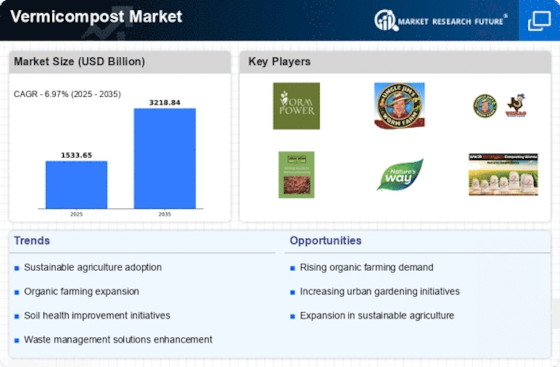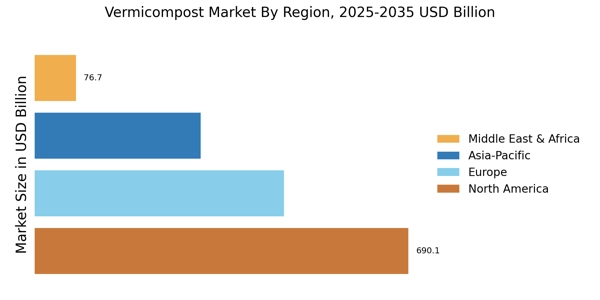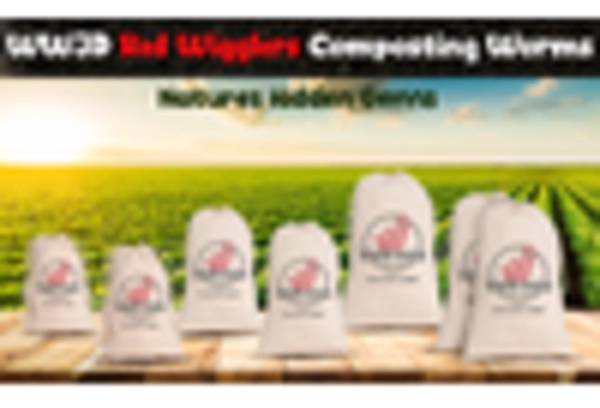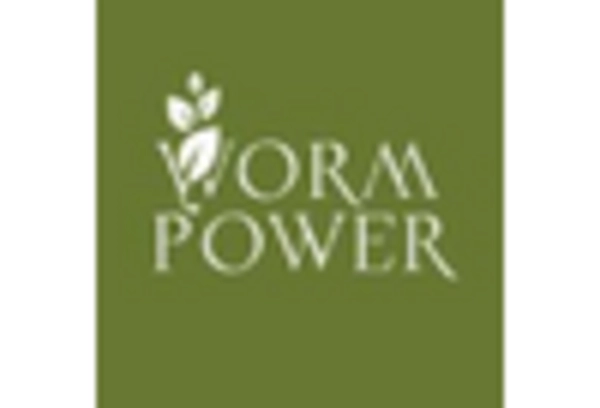Sustainable Agriculture Practices
The increasing emphasis on sustainable agriculture practices is a pivotal driver for the Vermicompost Market Industry. Farmers and agricultural stakeholders are progressively adopting eco-friendly methods to enhance soil health and crop yield. Vermicompost Market, being a natural fertilizer, aligns with these sustainable practices, offering a rich source of nutrients without the adverse effects associated with chemical fertilizers. Reports indicate that the organic fertilizer market, which includes vermicompost, is projected to grow at a compound annual growth rate of approximately 10% over the next five years. This trend suggests a robust demand for vermicompost as farmers seek to improve soil fertility while adhering to sustainable practices.
Urbanization and Waste Management
The rapid urbanization trend is creating a dual impact on the Vermicompost Market Industry. As urban areas expand, the generation of organic waste increases, necessitating effective waste management solutions. Vermicomposting presents an efficient method for recycling organic waste into valuable compost, thereby addressing both waste management challenges and the need for organic fertilizers. Municipalities are increasingly recognizing the benefits of vermicomposting programs, which could lead to a rise in community-based composting initiatives. This shift not only supports local agriculture but also promotes environmental sustainability, potentially driving the demand for vermicompost in urban settings.
Government Support and Regulations
Government initiatives and regulations promoting organic farming are significantly influencing the Vermicompost Market Industry. Various countries are implementing policies that encourage the use of organic fertilizers, including vermicompost, to reduce chemical dependency in agriculture. For instance, subsidies and financial incentives for organic farming practices are becoming more prevalent, which could potentially increase the adoption of vermicompost among farmers. Furthermore, regulatory frameworks that restrict the use of synthetic fertilizers are likely to bolster the demand for organic alternatives. This supportive environment may lead to a more favorable market landscape for vermicompost, as farmers look for compliant and effective fertilization options.
Consumer Preference for Organic Products
There is a noticeable shift in consumer preferences towards organic products, which is positively impacting the Vermicompost Market Industry. As consumers become more health-conscious and environmentally aware, the demand for organic fruits and vegetables is surging. This trend is compelling farmers to seek organic fertilizers, such as vermicompost, to meet consumer expectations for chemical-free produce. Market analysis suggests that the organic food market is expected to witness substantial growth, with projections indicating a potential increase of over 15% in the coming years. This consumer-driven demand for organic produce is likely to enhance the market for vermicompost as a preferred fertilization option.
Research and Development in Organic Fertilizers
Ongoing research and development in the field of organic fertilizers are crucial drivers for the Vermicompost Market Industry. Innovations in composting techniques and formulations are enhancing the effectiveness and efficiency of vermicompost. Research institutions and agricultural universities are exploring new methods to optimize vermicomposting processes, which could lead to higher nutrient content and better soil health outcomes. Additionally, the development of specialized vermicompost products tailored for specific crops is gaining traction. This focus on R&D may not only improve product quality but also expand the application scope of vermicompost, thereby potentially increasing its market share in the organic fertilizer segment.

















